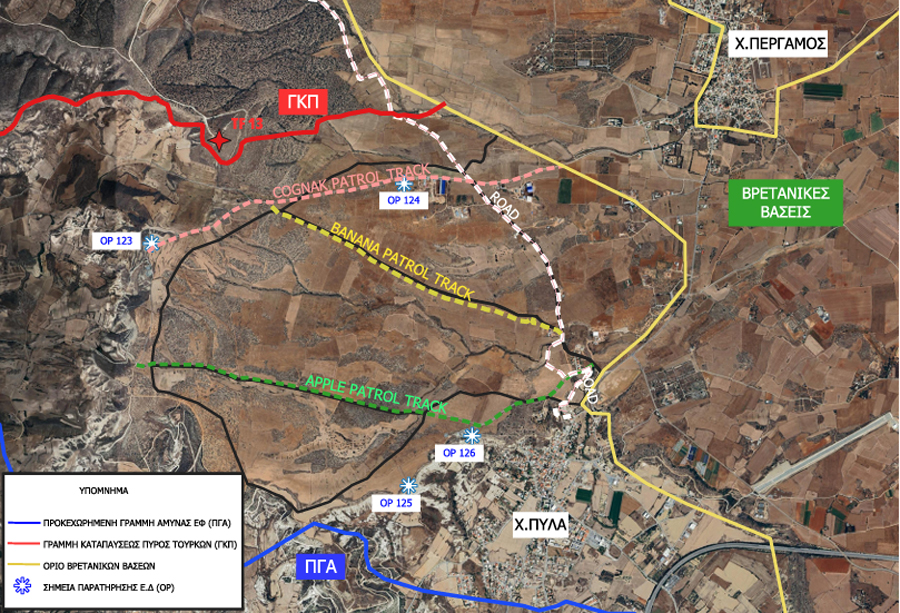
Newsroom
In a recent statement, the United Nations has announced a breakthrough in Pyla. According to their announcement, they have reached arrangements that are poised to bring resolution to the ongoing situation. They note that while some details are still under discussion, the framework agreement is set to take effect today.
The origins of this issue trace back to August when the Turkish Cypriot side entered the buffer zone with intentions to construct a road connecting the mixed village with occupied Arsos. In an unfortunate turn of events, personnel from the Turkish Cypriot side clashed with members of UNFICYP, who were attempting to prevent unauthorized construction in the area. This incident resulted in damage to UNFICYP vehicles and drew condemnation from the international community, including the five permanent members of the Security Council. Subsequently, discussions commenced to resolve the matter.

Diplomatic sources have indicated that the agreement regarding the buffer zone in the Pyla area has ensured its status and the civilian or police presence of the occupation authorities within it. This development is being described as a substantial confidence-building measure (CBM).
As per the agreement, a single area for urban development will be established to facilitate the harmonious coexistence of both Turkish Cypriot and Greek Cypriot communities in Pyla. This urban development will include residential areas, an asphalt road leading to Troulloi, the utilization of the state's water supply network in Pyla, the creation of photovoltaic parks, and an expansion of the village's urban use area.
Crucially, the agreement has delineated ceasefire lines within the buffer zone, ensuring the continued presence and oversight of the United Nations peacekeeping force (UNFICYP) over the entire zone. This measure effectively prevents any breach of the status quo and explicitly excludes military or police presence by occupation authorities within the buffer zone.
Furthermore, unregulated access to the Pyla area will be restricted, thanks to the establishment of a crossing point and full implementation of the Green Line regulation. The agreement ensures that the road will not be exploited for the settlement of Pyla, including the Plaka area, or for the passage of criminal elements and irregular migrants into the free areas, as had been observed recently.
This agreement also thwarts any military advantage-seeking by Turkish forces through the establishment of an urban and residential development zone in the Plaka region, ensuring that the road's usage remains exclusively civilian.
1/Speaking on Pyla/Pile top @UN official in #Cyprus, Colin Stewart, said: "This is a very good outcome." pic.twitter.com/QZk3BcJc45
— UN Cyprus (@UN_CYPRUS) October 9, 2023
Nicosia views this agreement as a highly positive development, achieved through diplomatic means rather than the imposition of force. It has safeguarded the interests of the local community, activated international support, and allowed Nicosia to lead with moral authority, transforming the crisis into an opportunity.
Sources cautiously express optimism that the agreement, signed by the United Nations and both sides at 11 a.m., will be upheld by all parties involved. They also reveal that our side will commence work in the area on October 23, creating approximately 400 plots.
The European Union is set to participate in the project, providing funding, and the Community Council of Pyla has granted its approval.
Regarding the background of the case, it's important to note that although the international community initially accepted the Turkish side's argument that the road was for humanitarian purposes, Nicosia successfully shifted this perception to highlight military motives behind the Turkish plans. Consequently, UNFICYP had no alternative on August 18 but to intervene, as allowing the Turkish plans to proceed would have jeopardized any prospects for future negotiations on the Cyprus problem.
Colin Stewart, the secretary-general's special representative, expressed his satisfaction with the agreement through a post on the X platform, describing it as a significant development achieved through constructive discussions with all stakeholders. He emphasized the importance of goodwill in reaching a mutually acceptable solution.
Joint statement by @USEmbassyCyprus @FranceaChypre and @UKinCyprus for the arrangement to stabilise the situation in Pyla/Pile
— UK in Cyprus (@UKinCyprus) October 9, 2023
https://t.co/KUVAPH2reX pic.twitter.com/xIylVvlVCL
The British High Commission, the French Embassy, and the US Embassy in Cyprus have welcomed the agreement as a means to stabilize the situation in Pyla. They acknowledge the constructive approach of all parties involved and the crucial role of the United Nations in finding a way forward for the benefit of both communities and regional security. These diplomatic missions reiterate their full support for UNFICYP and call on both sides to remain flexible and open to restart negotiations, highlighting the urgent need for the appointment of a UN envoy by the secretary-general.































